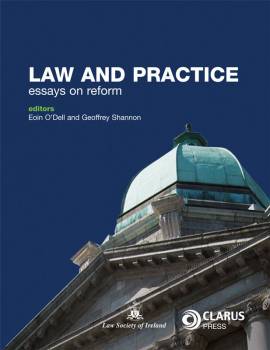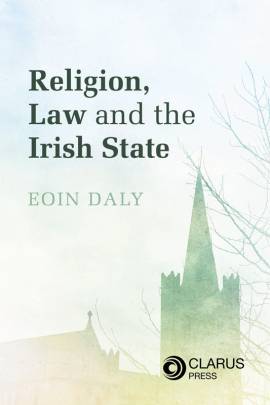A detailed and comprehensive annotation of the International Protection Act 2015
International Protection Act 2015: Annotated
€249.00
Description
Authors: Christopher Hughes, Stephen Hughes with Conleth Bradley SC | ISBN: 978-1-911611-12-7 | Format: Hardback | Publication Date: 21 January 2020 | Price: €249
About
International Protection Act 2015: Annotated is a new book that provides detailed annotations to each section of the International Protection Act 2015, which includes reference to case law and to relevant regulations and statutory provisions. This book also includes an analysis of the relevant practice and procedure throughout the International Protection application process and the relevant procedures in the Irish Courts.
International Protection Act 2015: Annotated will serve as an invaluable reference guide to practitioners and members of the public in comprehending the often complex and technical provisions contained in the 2015 Act.
The International Protection Act 2015
At the time of its enactment, Ireland was the only EU Member State without a single procedure; Ireland was the only Member State without a streamlined system of assessing all forms of international protection for asylum-seekers. The aim of the 2015 Act is to update and comprehensively reform the asylum system in Ireland. The 2015 Act provides for a streamlined single procedure to assess all forms of protection status for asylum-seekers that is intended, inter alia, to reduce lengthy delays in the asylum system.
According to Directive 2004/83/EC, “international protection” means the “recognition by an EU State of a non-EU national or a stateless person as a refugee or as a person eligible for subsidiary protection.” International Protection has been defined by the UNHCR (United Nations High Commissioner for Refugees) as follows:
“[A]ll actions aimed at ensuring the equal access to and enjoyment of the rights of women, men, girls and boys of concern to UNHCR, in accordance with the relevant bodies of law (including international humanitarian, human rights and refugee law).”
Furthermore, the UNHCR has stated that International Protection includes the following:
- Promoting ratification and supervising the application of international conventions for the protection of refugees at the global and, increasingly, the regional level to ensure refugees are identified and accorded appropriate status and standards of treatment in their countries of asylum;
- Ensuring, with and through national authorities, the safety and well-being of refugees in countries of asylum;
- Ensuring the needs of refugee children, refugee women and refugee men are met, including in particular the special needs of victims of violence, women who are single heads of household, elderly refugees, and child refugees who have been forcibly recruited as child soldiers and/or separated from their families;
- Promoting, with governments and with other United Nations and international bodies, measures to remove the causes of refugee flight so as to establish conditions that permit refugees to return safely to their homes;
- Facilitating, assisting and monitoring the safety and dignity of voluntary repatriation when this becomes feasible. When the aforesaid is not possible, promoting the other durable solutions of local integration or resettlement.
In essence the 2015 Act sets out the procedure for (1) Applications for International Protection and (2) Applications for Permission to Remain. In addition to the foregoing, the 2015 Act also serves to:
- Restate and modify certain aspects of the law relating to the entry into and presence in the State of persons in need of international protection;
- Amend various enactments including the Immigration Act 1999, the Immigration Act 2003 and the Immigration Act 2004;
- Repeal a number of enactments and statutory instruments;
- Give further effect to Council Directive 2001/55/EC relating to the minimum standards for giving temporary protection in the event of a mass influx of displaced persons and on measures promoting a balance of efforts between Member States in receiving such persons and bearing the consequences thereof;
- Give further effect to Council Directive 2004/83/EC on minimum standards for the qualification and status of third country nationals or stateless persons as refugees or as persons who otherwise need international protection and the content of the protection granted;
- Give further effect to Council Directive 2005/85/EC on minimum standards on procedures in Member States for granting and withdrawing refugee status. Significantly in this regard the Act will introduce a new ‘Single Procedure’ for the processing of asylum/ subsidiary protection claims;
- Give further effect to the Convention relating to the Status of Refugees done at Geneva on the 28th day of July 1951 (also known as “the 1951 Convention” and as “the Geneva Convention”) and the Protocol relating to the Status of Refugees done at New York on 31st January 1967 (also known as “the 1967 Protocol”).
Contents Include:
Part A: International Protection Act 2015 Fully Annotated
Part B: International Protection Regulations
- International Protection Act 2015 (Application for International Protection Form) Regulations 2016 (SI No 660 of 2016)
- International Protection Act 2015 (Temporary Residence Certificate) (Prescribed Information) Regulations 2016 (SI No 662 of 2016)
- International Protection Act (Permission to Remain) Regulations 2016 (SI No 664 of 2016)
- International Protection Act (Voluntary Return) Regulations 2016 (SI No 665 of 2016)
- International Protection Act 2015 (Places of Detention) Regulations 2016 (SI No 666 of 2016)
- International Protection Act (Travel Document) Regulations 2016 (SI No 667 of 2016)
- International Protection Act 2015 (Deportation) Regulations 2016 (SI No 668 of 2016)
- International Protection Act 2015 (Procedures and Periods for Appeals) Regulations 2017 (SI No 116 of 2017)
- The European Union (Dublin System) Regulations 2018 (SI No 62 of 2018)
- The European Communities (Reception Conditions) Regulations 2018 (SI No 230 of 2018)
Part C: Other Statutory Instruments
- The International Protection Act 2015 (Commencement) Order 2016 (SI No 26 of 2016)
- The International Protection Act 2015 (Commencement) (No.2) Order (SI No 133 of 2016)
- International Protection Act 2015 (Establishment Day) Order 2016 (SI No 661 of 2016)
- The International Protection Act 2015 (Commencement) (No.3) Order (SI No 663 of 2016)
- The Civil Legal Aid (International Protection Appeals Tribunal) Order 2017 (SI No 81 of 2017)
- The International Protection Act 2015 (Section 6(2)(j))(Commencement) Order 2018 (SI No 119 of 2018)
- International Protection Act 2015 (Safe Countries of Origin) Order 2018 (SI No 121 of 2018)
Part D: European Directives and Regulations
- Qualification Directive (2004/83/EC)
- Recast Qualification Directive (2011/95/EU)
- Asylum Procedures Directive (2005/85/EC)
- Recast Asylum Procedures Directive (2013/32/EU)
- Temporary Protection Directive (2001/55/EC)
- Reception Conditions Directive (2013/33/EU)
- Regulation (EU) 604/2013 (the ‘Dublin III Regulation’)
About the Authors
Christopher Hughes LL.B., A.M., BL is a practising barrister and accredited mediator. He was formerly a Presenting Officer and member of the Case Processing Panel in both the Office of the Refugee Applications Commissioner and the International Protection Office. He is a Member of the International Protection Appeals Tribunal. He is co-author of Criminal Procedure in the District Court: Law and Practice.
Stephen Hughes LL.B., LL.M., BL is a practising barrister. He was formerly a member of the Case Processing Panel in the Office of the Refugee Applications Commissioner. He is a member of the Case Processing Panel in the International Protection Office. He is co-author of Criminal Procedure in the District Court: Law and Practice.
Consultant Editor
Conleth Bradley SC is a senior counsel practising in the area of public law.
Who should buy this book?
This book is essential for any legal practitioner specialising in asylum law. It additionally serves as a comprehensive resource and useful point of reference for legal academics, law students, civil servants and members of the public with an interest in asylum law generally.
Only logged in customers who have purchased this product may leave a review.







Reviews
There are no reviews yet.